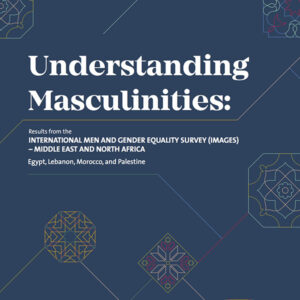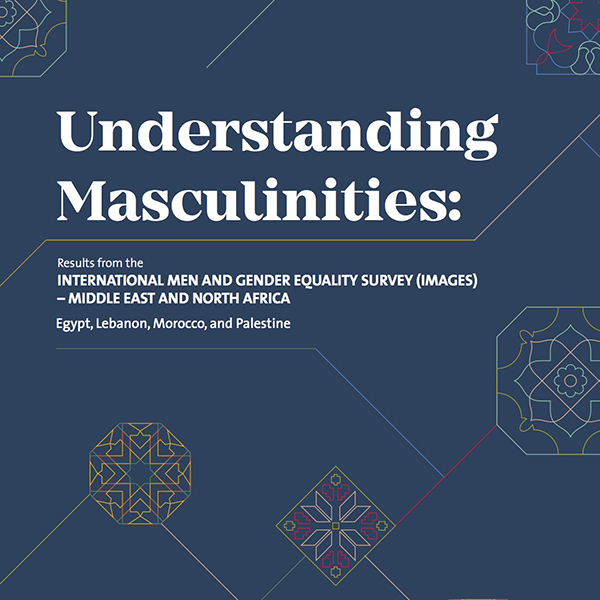Today, Equimundo and UN Women’s multi-country study in the Middle East and North Africa (MENA) – covering Egypt, Morocco, Lebanon, and Palestine – launches in Beirut, Lebanon as part of the “Masculinities in the Arab World” conference, revealing the reality of men’s lives behind the headlines.
 The International Men and Gender Equality Study in the Middle East and North Africa (IMAGES MENA) produced by Equimundo and UN Women in collaboration with local research partners is the first study of its kind and size in the Middle East and North Africa to take a wide-angle, comparative lens to the lives of men – as sons and husbands and fathers, at home and at work, in public and private life – to better understand how they see their positions as men, and their attitudes and actions toward gender equality.
The International Men and Gender Equality Study in the Middle East and North Africa (IMAGES MENA) produced by Equimundo and UN Women in collaboration with local research partners is the first study of its kind and size in the Middle East and North Africa to take a wide-angle, comparative lens to the lives of men – as sons and husbands and fathers, at home and at work, in public and private life – to better understand how they see their positions as men, and their attitudes and actions toward gender equality.
Equally important, IMAGES provides women’s perspectives on these same issues. The study includes quantitative and qualitative research with nearly 10,000 men and women aged 18 to 59 in Egypt, Lebanon, Morocco, and Palestine, including both urban and rural areas.
The study reveals that although traditional attitudes about gender equality dominate, at least one quarter of men hold more open and equitable views, supporting women’s economic, social, and political equality. Personal histories, family influence, and life circumstances are among the factors that impact men’s support for gender equality. Generally, men with higher incomes, with higher education, whose mothers had more education, and whose fathers carried out traditionally feminine household tasks are more likely to hold gender-equitable attitudes.
The findings show that while young women are showing more equitable views towards equality than the older generation, younger men do not necessarily hold more equitable views than older men.
The study also highlights the tremendous stress in men’s lives, namely the challenge of finding paid work and fulfilling the traditional masculine role of a provider in times of economic uncertainty, particularly in those countries affected by conflict. The effects of conflict and unemployment were frequently cited as reasons for, or aggravating factors in, men’s depressive symptoms. One-third to one-half of men in the four countries reported being ashamed to face their families because of lack of work or income.
The research also confirms international findings of the inter-generational cycle of violence: experiences of violence in childhood are associated with men’s use of violence in adult life. Violence breeds violence in all four countries. Men who witnessed their fathers using violence against their mothers, and men who experienced some form of violence at home as children, were significantly more likely to report perpetrating intimate partner violence in their adult relationships.
On the positive side, there is also evidence for inter-generational cycles of care: although many traditional norms are reinforced at home, fathers can have a powerful role in breaking these norms. Fathers who encouraged daughters to take on non-traditional professions or to work outside the home, or who allowed daughters to choose their husbands, seemed to contribute to the emergence of more empowered women.
“There is a long way to go for men to fully accept and support equality for women in the Arab region, as in many parts of the world. Across all four countries, we see that one of the biggest disrupters of gender inequality is when men take on more of the activities in the home typically defined as women’s roles.”
Indeed, the research points to some key pathways for equality, which are particularly notable around involved fatherhood: In all four countries, men whose fathers had participated in traditionally feminine household work and caregiving, as well as men who were taught to do this work as children, were far more likely to report contributing in this way within their own marriages.
Another factor associated with men’s more equitable behaviors is women’s work outside the home. In two of the countries, men whose wives worked outside the home were more likely to do more of the unpaid care work. In a region where only about a quarter of women work outside the home, this points to the potential dual impact of policies to increase women’s paid work.
“For our work as UN Women, this report is incredibly important as a tool in our programming, in our lobbying and in our efforts to work with member states, civil society and communities. The results, though they may seem bleak when looking purely at numbers, do affirm that there are also true stories of champions, of men and women who believe strongly in gender equality. Indeed, this study is a seed, and its stories will grow into a tree of hope and humanity.”
As seen in this study and many others, men frequently dominate or control household decision-making, political and leadership spaces, and the daily lives of women and girls. This research offers a unique perspective on the state of male-female relations in the MENA region, it helps to better understand these dynamics, and to subsequently design and improve programs and policies to address them.
Download the full report here.
The International Men and Gender Equality Survey (IMAGES), created by Equimundo and the International Center for Research on Women (ICRW), is one of the most comprehensive studies ever on men’s practices and attitudes as they relate to gender norms, attitudes toward gender equality policies, household dynamics including caregiving and men’s involvement as fathers, intimate partner violence, health, and economic stress. To date, it has been implemented in or is in progress in over 30 countries globally, and is part of a multi-year, multi-country effort to build the evidence base on gender equality; raise awareness among policymakers and program planners of the need to involve men in health, development, and gender equality issues; and integrate gender equality within public institutions and policies. Find out more here about IMAGES globally.

